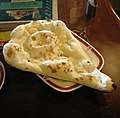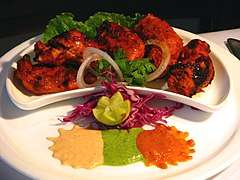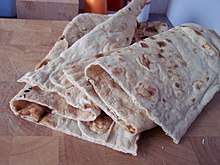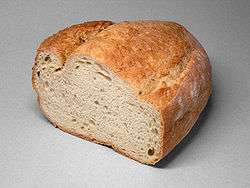Baati
Baati (Rajasthani: बाटी) is a hard, unleavened bread cooked in most of areas of Rajasthan,[1] and in some parts of Madhya Pradesh[2] and Gujarat states of India. It is prized for its long shelf life and high nutritional content[3], and, in desert areas, for the minimal quantity of water required for its preparation. Baati is commonly eaten with dal, hence also referred to as dal baati. In some regions, especially Madhya Pradesh, it is also paired with a roasted aubergine mash called bharta. Baati is also closely related to litti (cuisine), popular in eastern Uttar Pradesh (Varanasi) and western Bihar. Litti potato, tomato and roasted aubergine).
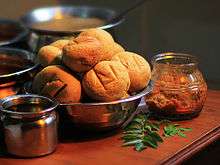 Baati | |
| Type | Bread |
|---|---|
| Place of origin | Rajasthan (India) |
| Region or state | Rajasthan, Khargone, Madhya Pradesh |
| Main ingredients | Ghee, clarified butter, Flour, Water |
| Variations | Litti (cuisine) in Bangalore |
Baati can either be plain or have various kinds of fillings, including onions, peas, and sattu. Bafla is a kind of baati, which is softer. Bafla and baati are always eaten with hot dal with pure ghee and chutney.
Churma is a popular delicacy usually served with baatis and dal. It is coarsely ground wheat crushed and cooked with ghee clarified butter and sugar. Traditionally it is made by mashing up wheat flour baatis or leftover rotis in ghee and jaggery, optionally mixed with dry fruits and flavours. It can be eaten alone or with dal.
Daal-baati-churma
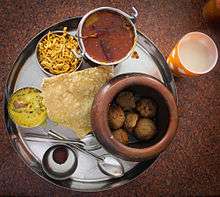
Dal-baati-churma is a popular pairing of three dishes and a complete meal [4]. Dal Baati is a popular Rajasthani dish consisting of mainly Uradh Dal (combination of five lentils) [5] and Baati i.e. small wheat bread balls. Baati is dipped in pure ghee and served hot in a traditional earthen pot.[6] Dal is served in a small bucket shaped vessel with a red chilli tadka on top, spicy garlic chutney, or with besan (gram flour).[7] It is traditionally prepared by coarsely mashing baati and pouring ghee on top of it. It is commonly served at all festivities, including religious occasions, wedding ceremonies, and birthday parties in Rajasthan[4].
Daal Baati Thaali
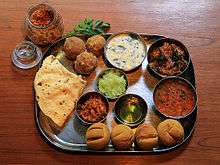
Rajasthani thaali is incomplete without baati. Baati is also served with besan gatte, boondi raytaa. Garlic chutney, paapad, kadhi and mango pickle [4].
In Madhya Pradesh, you will see Dall-Baati being served with other dishes as well for example, Bharrta (Cooked on direct flames and mashed with raw spices) or fried potatoes. Kadhi (cooked with Besan (gram flour) and butter milk) is also eaten with Daal-Baati as it adds the liquid element in the whole combination. Baati, as made up of different kinds of flours, makes you thirsty. To maintain the water content in the whole combination Kadhi is also eaten with Daal-Baati.
Gatte ki Sabzi, made up of Besan (gram flour) and spices, is also eaten in western Madhya Pradesh and Rajasthan. It is little bit spicier so added the element of spices to the whole thali.
Mango Pickle and Green Chutney ( made with coriander, lemon, tomatoes, rock salt, cumin seeds and sea salt) are integral part of the thali. In western Madhya Pradesh towards Malwa, sweet rice is also cooked and served in the Thali. The rice is cooked with saffron, sugar and cloves.
See also
- List of Indian breads
References
| Wikimedia Commons has media related to Baati. |
- Rajasthani Cookbook by Tarla Dala, p. 102
- "7 Must Have Dishes From Madhya Pradesh You Just Cannot Miss". HolidayIQ. Retrieved 2019-01-08.
- "About Dal Bati". ifood.tv. Retrieved 2019-01-08.
- "Dal Bati Churma Party Menu Recipes". Enhance Your Palate. 2019-09-21. Retrieved 2019-10-05.
- "Rajasthani Panchmel Dal - Five Lentil Soup". Enhance Your Palate. 2016-09-30. Retrieved 2019-10-05.
- "Rajasthani Bati (Unleavened Bread) for Dal-Bati-Churma". Enhance Your Palate. 2016-09-30. Retrieved 2019-10-05.
- "Dal-Bati-Churma: A Rajasthani Delight". indiacanteen.tastyfix.com.
| Wikibooks Cookbook has a recipe/module on |

